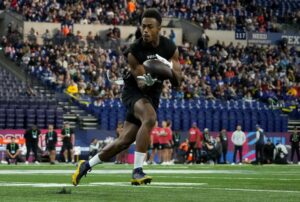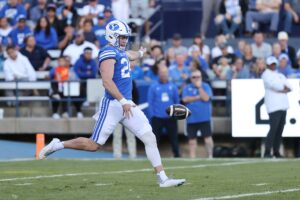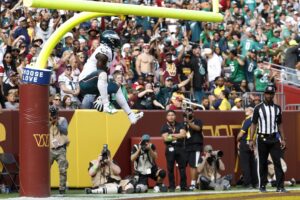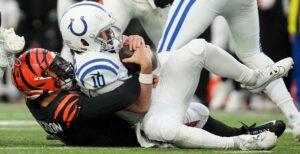Fans are often quick to write off players based on small sample sizes. Whether it’s a player playing to his potential in his first few games or someone really struggling at the beginning of his career and being labeled a “bust.”
Neither of which should be where you stand on a player. Players often need time to develop and learn in the league. Sometimes players start off playing lights out and fade out as the years pass. Other times they start slow and become great over time.
More often than not, many players need time to adjust to the speed of the NFL and all of the challenges that come with it. Perhaps the most watched and talked about players are young rookie quarterbacks. They are often the most criticized players on the field at any given time, but perhaps the best thing they can do starting out is “fail forward.”
Failing Forward as a Young Quarterback
The concept of failing forward has been used in some small circles among draft analysts and football fanatics. In recent years we have seen many come in – quarterbacks like Jared Goff and Marcus Mariota – and struggle to get their footing.
No quarterback should be expected to come into the NFL and learn the complexity of the playbook, defensive coverages and overall speed of the game at the rate many fans expect them to. Instead, we should embrace the highs and lows they have throughout the season. Letting players struggle and “fail forward” encourages quarterback learning through the highs and the lows of a season. Ultimately, this sets the stage for a potential jump from year one to year two with a team.
Failing Forward in Action
The quarterback position is the hardest position to transition to in the NFL. It often takes players two or three years to comprehend the system and show progress. Early in their careers, the debate is centered around whether a rookie quarterback should take the field or how long they should sit and learn. Unfortunately there’s no “right answer” here, because each quarterback is different.
Some players like Patrick Mahomes will benefit greatly from sitting a year and learning the playbook. There are other players, such as the New York Jets own Sam Darnold, who learn best by being thrown out to sink or swim. This is where failing forward comes into motion.
Darnold is a perfect example of letting a young quarterback learn from his mistakes firsthand and fail forward. As the season progressed, he experienced the highs and lows that many expected. The team’s record might not show it, but Darnold has played at a high level over the past two weeks. He started his career with a pick-six, but followed up with well-timed throws that showed plenty of promise.
Situation Matters
The most important thing to do for young quarterbacks is to give them the tools they need to succeed. More often than not, we see rookie quarterbacks drafted by bad teams in early rounds. Whether it’s a weak supporting cast or a lack of coaching, these teams tend to have a variety of issues that inhibit the growth of young talent.
This kind of situation has been prevalent over the past couple of years. This past off-season the Chicago Bears prioritized weapons that would benefit their own young quarterback: Mitchell Trubisky. The Los Angeles Rams did the same thing for Goff, bringing in Brandin Cooks and others to ensure success.
The most important part of the equation is usually the coach. They are tasked with managing the growth of their young quarterback and ensuring their on-field play is reflective of the time and energy put into his training. Coaches, teams and fans alike are looking for a return on investment with these rookie quarterbacks. It’s up to the coaches to put them in the best situation to do that.
Main Photo:
Embed from Getty Images






